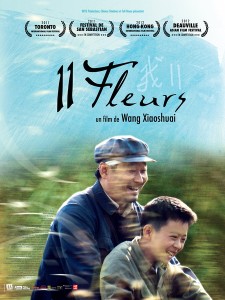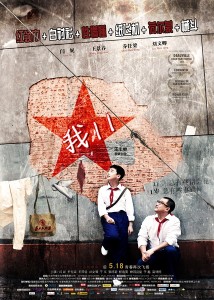11 Flowers
我 11
China/France/Hong Kong, 2011, colour, 1.85:1, 116 mins.
Director: Wang Xiaoshuai 王小帅.
Rating: 8/10.
Involving snapshot of childhood set near the end of the Cultural Revolution.
Guizhou province, southern China, 1975, a year before the end of the Cultural Revolution. Eleven-year-old Wang Han (Liu Wenqing) lives in a small town to which his family moved from Shanghai a few years earlier under the government’s Third Front movement – to protect nationally important industries from possible attack by the Soviet Union by relocating them inland in remote, mountainous areas. At home, Wang Han lives with his actor father (Wang Jingchun), who encourages him to become a painter so he can “live freely”, his strict mother (Yan Ni) who is always worrying about money, and his younger sister (Zhao Shiqi). At school, he has three pals: tall, bespectacled Weijun (Lou Yihao), chubby Louse  (Zhang Kexuan) and little Mouse (Zhong Guo Liuxing). They all spy on pretty fellow student Xie Juehong (Mo Shiyi), whom one day faints after being summoned to see the school’s headmistress, Miss Zhou (Yu Yue). One day, Wang Han is made leader of group gymnastics at his school but is told he must first get a new white shirt; reluctantly, his mother uses valuable clothes coupons to buy the material. Meanwhile, the body of a well-known lecher, Chen Kunfang, who recently moved into the town, is discovered. At school, Xie Juehong is questioned by the police. Then, playing by the river, Wang Han has his new shirt stolen by a man, Xie Jueqiang (Wang Ziyi), who is on the run.
(Zhang Kexuan) and little Mouse (Zhong Guo Liuxing). They all spy on pretty fellow student Xie Juehong (Mo Shiyi), whom one day faints after being summoned to see the school’s headmistress, Miss Zhou (Yu Yue). One day, Wang Han is made leader of group gymnastics at his school but is told he must first get a new white shirt; reluctantly, his mother uses valuable clothes coupons to buy the material. Meanwhile, the body of a well-known lecher, Chen Kunfang, who recently moved into the town, is discovered. At school, Xie Juehong is questioned by the police. Then, playing by the river, Wang Han has his new shirt stolen by a man, Xie Jueqiang (Wang Ziyi), who is on the run.
REVIEW
The distance travelled as a film-maker by Wang Xiaoshuai 王小帅 during the past six years can be seen by comparing 11 Flowers 我11 with his 2005 Shanghai Dreams 青红. Both are semi-autobiographical, set during the period when his own family moved from Shanghai to Guizhou province as China relocated important industries inland from fear of attack by the Soviet Union (the government’s so-called Third Front movement, begun in the mid-1960s). But where Shanghai Dreams, set in the early 1980s, was a largely academic exercise that failed to communicate the teenage feelings and aspirations it was meant to be about, 11 Flowers actually speaks to an audience, without any loss of artistry.
Wang’s main weakness as a film-maker has always been in reconciling content with technique – a problem he managed to crack in a couple of earlier films (Beijing Bicycle 十七岁的单车, 2000, and the unfortunately little-seen Dream House 梦幻田园, 1999) and seems finally to have solved since the breakthrough of Chongqing Blues 日照重庆 (2010). The result, in 11 Flowers, is a thoroughly involving coming-of-age drama that’s his best film since Bicycle.
Though the Third Front background is not so familiar, there’s an awful lot that still is in the film’s setting: late Cultural Revolution, small country town, a larky boy and his pals – plus a Whistle Down the Wind-like friendship between the young protagonist and a murderer on the run. To its credit, the film focuses tightly on human relationships rather than trying to score tired political points from the setting: the warm relationship between Wang Han and his actor/artist father, cemented during painting sessions and walks to school in the morning; the boy’s strict but loving mother, beautifully played by Yan Ni 闫妮 (Cow 斗牛, 2009) in her best of several roles this year [2011]; the easy but unstable chemistry between Wang Han and his school pals; and the way in which children only learn the whole truth of adult matters obliquely, or late in the day.
Using his own memories of childhood, including meeting a runaway murderer, Wang has constructed a semi-fictional canvas that moves seamlessly from schooltime pranks and family squabbles, via the device of a very special shirt, to a secret friendship that briefly defines the boy’s position among his group. But that friendship only forms a small part of the movie, which is basically about a family living in a town where the children feel at home but their parents feel displaced. In one sequence, Wang Han and his father meet Wang Han’s female schoolmate Xie Juehong and her father in the countryside: while the men are bemoaning their relocation to the countryside, the boy is transfixed by being so physically close for the first time to a girl he’s admired from afar.
This wall between the kids’ and the adults’ feelings reflects the general wall between childhood and adulthood. Like Lan 我们天上见 (2009), by Jiang Wenli 蒋雯丽, which was also set around the same time, 11 Flowers is about the inner emotional lives of people living during a special time, not about that time per se. The film’s Chinese title means simply “Me, 11”, and that says everything about its viewpoint: the young protagonists’ antics, while providing comic relief and mirroring popular sentiments of the time, are just that, rather than some kind of oblique commentary on the period.
Period detail looks spot on, and much more natural than in Shanghai Dreams, with terrific photography by Dong Jinsong 董劲松 (People Mountain People Sea 人山人海, 2011) and production/costume design by Lv Dong 吕东 (A Good Rain Knows 호우시절, 2009) that incorporate splashes of colour and warmth among the general 1970s drabness. Though set in mountainous Guizhou province, the film was actually shot just across the border, around Wansheng, near Chongqing, with no loss of credibility.
CREDITS
Presented by WXS Productions (CN), Chinese Shadows (HK), Full House (FR).
Script: Wang Xiaoshuai, Lao Ni. Photography: Dong Jinsong. Editing: Nelly Quettier. Music: Marc Perrone. Production design: Lv Dong. Costume design: Lv Dong. Sound: Fu Kang, Jean-Paul Hurier.
Cast: Yan Ni (Deng, Wang Han’s mother), Wang Jingchun (Wang Han’s father), Liu Wenqing (Wang Han), Zhong Guo Liuxing (Mouse), Zhang Kexuan (Louse), Lou Yihao (Weijun), Wang Ziyi (Xie Jueqiang, the murderer), Mo Shiyi (Xie Juehong), Qiao Renliang (Weijun’s elder brother), Yu Yue (Miss Zhou, school headmistress), Zhao Shiqi (Wang Han’s younger sister), Cao Shiping (Xie Fulai, Xie Juehong’s father), Cao Gang (police officer), Yang Zhiliang, Su Xiaohan, Fu Tianyu, Chen Wei, Li Ji, An Ni, Wang Jun, Sun Qi, Dong Jilai, Gao Shang, Huang Hui, Wang Jiali, Wang Ying.
Premiere: Toronto Film Festival (Special Presentations), 11 Sep 2011.
Release: France, 9 May 2012; China, 18 May 2012; Hong Kong, tba.
(Review originally published on Film Business Asia, 3 Nov 2011.)
